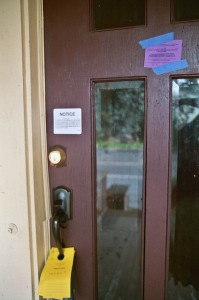What are a Renter’s Rights During a Foreclosure?
June 2, 2015 2 Comments
Without a doubt, foreclosure can be a devastating event for homeowners. What’s less commonly discussed, however, are the effects a foreclosure can have on renters.
What, you may ask, does foreclosure have to do with renting? Only homeowners can be foreclosed upon, right? Generally speaking, it is true that foreclosures take place when a mortgagee fails to make his or her loan payments. The bank or lender then steps in to essentially take possession of the home, and the homeowner loses ownership of the property due to non-payment.
That being said, it is definitely possible for a renter to be affected by a foreclosure if they are renting a home or part of a home that goes into foreclosure. The homeowner may still reside in the home along with the renter(s), or the property may be solely inhabited by the renter(s) at the time of foreclosure. For whatever reason, if the owner of the home stops making mortgage payments and the home becomes foreclosed, the renters will be evicted.
Sometimes, whether out of fear, embarrassment, negligence or a combination of all three – a foreclosed homeowner fails to alert the renter(s) to the fact that they will soon be without a place to live. When the foreclosure occurs, tenants will be evicted right along with any homeowners who are living in the home. Unfortunately, if the tenants were not alerted to the upcoming foreclosure, they may find themselves unexpectedly homeless with no warning.
When this happens, the affected tenants do have rights. It is important that renters who find themselves out on the streets due to the homeowner’s failure to inform know that they can take action. If you have been evicted from your rental with no prior warning from your landlord (the mortgage holder) – the first thing you must do is secure all of your belongings that are in the home. If you are only granted access to the property by appointment, do your best to gather friends and family to help you at the allotted time(s) so that you do not lose your belongings along with your place of residence.
As soon as you have recovered all of your personal property that was inside the home, secure a place to stay. You may need to rely on the kindness of friends or a family member during this type of situation, however it should only be temporary. When you are settled, contact an attorney in your area who is familiar with foreclosure and real estate matters. Time is of the essence, so the sooner you hire a real estate lawyer, the better.
With the help of the right real estate/foreclosure attorney, you can file a claim against your landlord (the homeowner) and potentially the new owner of the home for illegally evicting you. In doing so, you may be able to recover some or all of the rent that you paid (in the instance that the home was rented illegally). You may also be able to sue for damages you incurred while you were without a place to live, and when you were denied access to your personal belongings.
Image credit: Sarah Gilbert

Pingback: I’m Permanently Disabled: Can My Landlord Evict Me? | Veitengruber Law
Pingback: Do I Have to Pay Rent if the Home I Rent is in Foreclosure? | Veitengruber Law